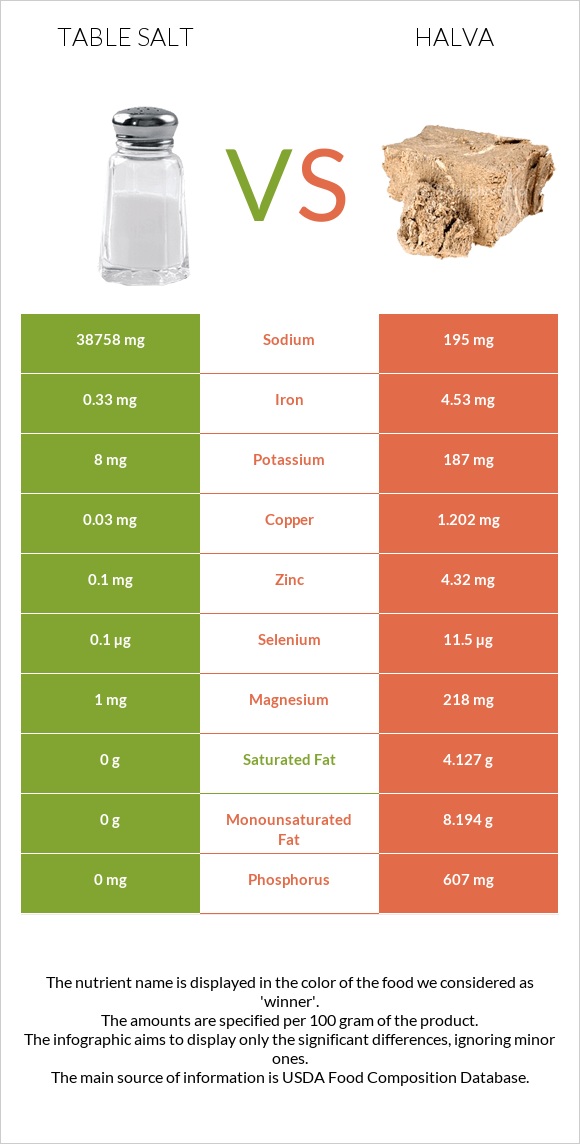Table salt vs. Halva — In-Depth Nutrition Comparison
Compare
The main differences between table salt and halva
- Halva is richer than table salt in copper, phosphorus, iron, magnesium, zinc, vitamin B1, manganese, vitamin B6, and selenium.
- Daily need coverage for sodium for table salt is 1677% higher.
- Halva contains less sodium.
- Table salt has a lower glycemic index than halva.
Food types used in this article are Salt, table and Candies, halavah, plain.
Infographic

Infographic link
Mineral Comparison
Mineral comparison score is based on the number of minerals by which one or the other food is richer. The "coverage" charts below show how much of the daily needs can be covered by 300 grams of the food.
| Contains more MagnesiumMagnesium | +21700% |
| Contains more CalciumCalcium | +37.5% |
| Contains more PotassiumPotassium | +2237.5% |
| Contains more IronIron | +1272.7% |
| Contains more CopperCopper | +3906.7% |
| Contains more ZincZinc | +4220% |
| Contains more PhosphorusPhosphorus | +∞% |
| Contains less SodiumSodium | -99.5% |
| Contains more ManganeseManganese | +773% |
| Contains more SeleniumSelenium | +11400% |
Vitamin Comparison
Vitamin comparison score is based on the number of vitamins by which one or the other food is richer. The "coverage" charts below show how much of the daily needs can be covered by 300 grams of the food.
| Contains more Vitamin CVitamin C | +∞% |
| Contains more Vitamin B1Vitamin B1 | +∞% |
| Contains more Vitamin B2Vitamin B2 | +∞% |
| Contains more Vitamin B3Vitamin B3 | +∞% |
| Contains more Vitamin B5Vitamin B5 | +∞% |
| Contains more Vitamin B6Vitamin B6 | +∞% |
| Contains more Vitamin B12Vitamin B12 | +∞% |
| Contains more FolateFolate | +∞% |
All nutrients comparison - raw data values
| Nutrient |  |
 |
DV% diff. |
| Sodium | 38758mg | 195mg | 1677% |
| Copper | 0.03mg | 1.202mg | 130% |
| Phosphorus | 0mg | 607mg | 87% |
| Polyunsaturated fat | 0g | 8.481g | 57% |
| Iron | 0.33mg | 4.53mg | 53% |
| Magnesium | 1mg | 218mg | 52% |
| Zinc | 0.1mg | 4.32mg | 38% |
| Vitamin B1 | 0mg | 0.424mg | 35% |
| Manganese | 0.1mg | 0.873mg | 34% |
| Fats | 0g | 21.52g | 33% |
| Vitamin B6 | 0mg | 0.348mg | 27% |
| Protein | 0g | 12.49g | 25% |
| Calories | 0kcal | 469kcal | 23% |
| Selenium | 0.1µg | 11.5µg | 21% |
| Carbs | 0g | 60.49g | 20% |
| Monounsaturated fat | 0g | 8.194g | 20% |
| Saturated fat | 0g | 4.127g | 19% |
| Fiber | 0g | 4.5g | 18% |
| Vitamin B3 | 0mg | 2.856mg | 18% |
| Folate | 0µg | 65µg | 16% |
| Vitamin B2 | 0mg | 0.088mg | 7% |
| Potassium | 8mg | 187mg | 5% |
| Vitamin B5 | 0mg | 0.174mg | 3% |
| Vitamin B12 | 0µg | 0.04µg | 2% |
| Calcium | 24mg | 33mg | 1% |
| Vitamin C | 0mg | 0.1mg | 0% |
| Net carbs | 0g | 55.99g | N/A |
Macronutrient Comparison
Macronutrient breakdown side-by-side comparison
Protein:
0 g
Fats:
0 g
Carbs:
0 g
Water:
0.2 g
Other:
99.8 g
Protein:
12.49 g
Fats:
21.52 g
Carbs:
60.49 g
Water:
3.67 g
Other:
1.83 g
| Contains more OtherOther | +5353.6% |
| Contains more ProteinProtein | +∞% |
| Contains more FatsFats | +∞% |
| Contains more CarbsCarbs | +∞% |
| Contains more WaterWater | +1735% |





